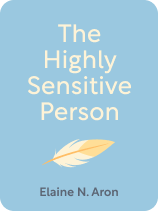

This article is an excerpt from the Shortform book guide to "The Highly Sensitive Person" by Elaine Aron. Shortform has the world's best summaries and analyses of books you should be reading.
Like this article? Sign up for a free trial here.
Do you find socializing overwhelming? Do you feel like your introversion prevents you from connecting with people?
If you feel overstimulated or exhausted by social situations, you may be a highly sensitive introvert. High sensitivity may make it difficult to form relationships with people, especially since it isn’t well understood by the general population.
With this in mind, here’s how to navigate the social scene as a highly sensitive introvert.
Social and Professional Life
HSPs may feel overwhelmed and overstimulated in social situations. Moreover, an HSP’s reaction to overarousal (freezing up or shutting down) can look like unsociability and may make others believe HSPs don’t like them or don’t enjoy being around them. To maintain a healthy social and professional life, Aron recommends forming bonds with other HSPs, explaining your trait to non-HSPs, finding a job that calls to you personally, and creating a persona you can use in social situations.
(Shortform note: In addition to socializing with friends, flirting can be a tricky territory for a highly sensitive introvert. If you’re struggling with how to flirt with others, consider whether the type of flirting you’re doing is what best communicates your feelings to the other person. Experts suggest that flirting physically may not be as appealing to HSPs as trying to establish a genuine emotional connection with the other person.)
It’s important to seek out other HSPs in your life. Other HSPs are likely to be understanding of your unique needs and tendencies as an HSP, and having others to talk to about your trait can provide needed support. While they’re still a minority, the odds are that about one in five people you meet is an HSP, so be on the lookout for potential friends who share your trait.
(Shortform note: Ironically, because of their sensitive natures, HSPs can attract the type of person who won’t or can’t provide the support they need, such as narcissists. HSPs should be selective about whom they choose to spend time with, seek people with similar interests who can reciprocate their needs, and let go of harmful friendships.)
To succeed professionally, Aron recommends finding a job that calls to you and suits your HSP traits and needs. Your contribution to the world is valuable, and as an HSP you play an important role in balancing out the tendencies of non-HSPs in the workplace. Your deep processing, attention to detail, and care for others make you an excellent employee. HSPs are particularly well-suited for professions like education, medicine, religion, and the arts.
(Shortform note: Even in a suitable role, HSPs’ tendency to become overwhelmed can put them at higher risk for burnout. To avoid burnout, HSPs should set and maintain boundaries, be aware of and avoid things that will trigger overwhelm, and avoid holding themselves to unrealistic expectations of perfection.)
Find Your Persona
Aron also suggests that you create a persona that helps you interact with others, particularly if you’re an introvert (she says about 70% of HSPs are introverted). A persona is a social role that comes with certain guidelines and expectations for behavior, like a template for how to navigate a social situation. Your persona should fit you and your circumstances. If you’re a doctor, for example, your persona should probably be calm and logical. If you’re a musician, your persona may be more free and spontaneous.
(Shortform note: Aron’s advice on personas may be better characterized as helpful advice for people who are socially inept rather than introverted. Socially inept people tend to struggle to understand social cues and expectations, and they may come off to others as antisocial or rude. Adopting a persona as Aron advises can give socially inept people a clear set of guidelines to follow during interactions, reducing discomfort and increasing confidence and enjoyment of socializing.)
Aron acknowledges that this advice may seem like she’s telling you to be “fake” or to lie, but really it’s just an explanation of how open you should be in a given context. Some degree of lying or omission is an expected part of social interaction, usually in the interest of not seeming rude or avoiding hurting someone’s feelings. For example, say you’re invited to attend a work event that you don’t want to go to. While it may be the most accurate answer, “I don’t want to” isn’t a socially acceptable answer. In that situation, most of us tell a half-truth or lie to avoid the appearance of rudeness.
(Shortform note: Lying is actually a very common part of many social interactions. Research suggests that people will lie in about 20% of their interactions that last at least 10 minutes. Lies tend to be more socially acceptable when they’re done for the sake of others rather than out of self-interest, so a lie made to avoid hurting someone else’s feelings—like saying you’re too busy to spend time with them—wouldn’t be considered as egregious as a lie that’s solely for your own benefit.)
In fact, Aron argues that the rules that we should never lie, should always be “authentic,” and that we’re not being judged aren’t accurate, and we’re frequently—but unspokenly—expected to bend or break them. HSPs know that people are watching and judging, and they’re more acutely aware of it than non-HSPs. Your persona will help you navigate these unspoken social expectations and feel less affected by others’ judgments.
(Shortform note: Humans’ tendency to judge others likely developed as an evolutionary trait to help us identify enemies and friends. From a psychological standpoint, Carl Jung theorized that the things we judge others for are things we don’t like about ourselves, a phenomenon he called “projection.” If you’re an HSP who fears socializing because you don’t want to be judged by others, you may take comfort in the knowledge that their judgment is actually not about you but about themselves.)

———End of Preview———
Like what you just read? Read the rest of the world's best book summary and analysis of Elaine Aron's "The Highly Sensitive Person" at Shortform.
Here's what you'll find in our full The Highly Sensitive Person summary:
- The strengths and challenges associated with being a highly sensitive person
- How to manage your sensitivity in your personal, social, and professional life
- Why you should stop labeling yourself as "shy"






